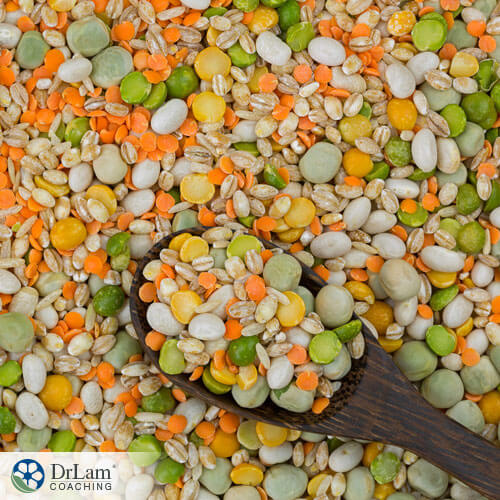 You may be eating a great diet, exercising religiously, and sleeping adequately, but still have symptoms making you feel unwell. And it’s often difficult to pinpoint the exact source of the problem ¬– it could be an allergy, a food intolerance, or something else diet-related. Many people are eliminating certain lectins from their diet to relieve their issues. At this point, the research is somewhat limited, but some people report benefits and a tremendous amount of relief.
You may be eating a great diet, exercising religiously, and sleeping adequately, but still have symptoms making you feel unwell. And it’s often difficult to pinpoint the exact source of the problem ¬– it could be an allergy, a food intolerance, or something else diet-related. Many people are eliminating certain lectins from their diet to relieve their issues. At this point, the research is somewhat limited, but some people report benefits and a tremendous amount of relief.
Since the lectin-free diet eliminates a lot of extremely healthy foods, it’s understandable that you may be a bit reserved about the approach. But it’s important to know what you’re eating and whether those foods could be bothering your digestive system. As you probably know, digestive issues can affect every aspect of your body. Sometimes, simply minimizing foods from a particular group such as lectins is all you need to do to reboot your body and get a jump start towards optimal health.
Lectins are proteins that naturally occur in most plants and in almost all organisms. Scientists have not yet determined the function of lectins in the human body. In plants, they offer protection as a plant grows and are important for seed survival, which is why there’s such a high concentration in plant seeds. As part of the immune system in humans, this carbohydrate-binding group of complementary proteins is thought to aid inflammatory cells in their activities.
Lectins are not always harmful to eat but can be dangerous—even toxic and deadly—if consumed in large quantities. Two classes of lectins, prolamins and agglutinins, have been linked to health-related issues such as
Prolamins such as gluten are rich in the amino acid proline.
Agglutinins, including wheat germ, kidney bean lectin, and soy lectin, are also rich in proline but have a tendency to cause red blood cells to clump together, which can have adverse effects on the body. Agglutinins can often be reduced by soaking, sprouting, fermenting, or heating foods, to make them more digestible. However, not all. For example, wheat germ is extremely resistant to these methods and can wreak havoc in your digestive tract.
To date, no studies or reports have measured the amount of lectins in certain foods. So, if you suspect your dietary issues may be related to lectin proteins, you should start by eliminating foods with high concentrations of prolamins and agglutinins from your diet.
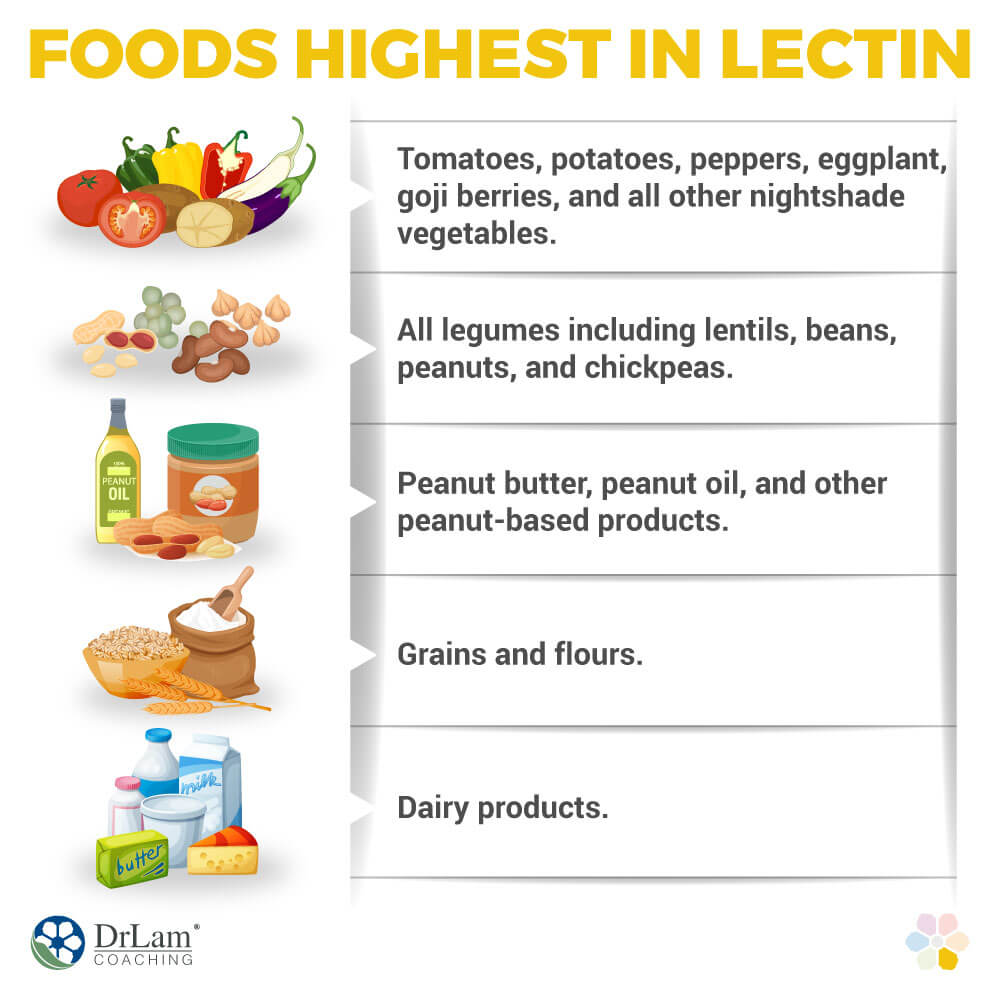
All living things contain lectins, but some foods have a higher lectin content than others such as
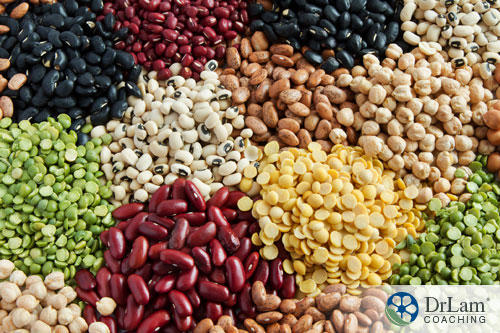
The safest path for those trying to figure out food intolerances by avoiding foods high in lectins is to start by eliminating common foods known to contain lectins like soy and wheat products, as well as the oils derived from them.
Lectins are proteins with a key that fits into a particular lock – in other words, a compatible carbohydrate. All living organisms are made up of cells with cell membranes. Carbohydrates can bind to proteins and lipids within the cell membrane and if a particular lectin “key” is compatible with a particular carbohydrate “lock”, it opens the door, disrupting the cell membrane. This damages the cell and initiates a cascade of immune and autoimmune events that can lead to cell death.
The good news is that certain lectins are inactivated by specific carbohydrates known as monosaccharides and oligosaccharides that actually bind to the lectin key, preventing the protein from attaching itself to the carbohydrate lock on the cell membrane. Glucosamine is an excellent supplement that helps protect the gut and cartilage from inflammation and negative effects of lectins found in wheat gluten.
Lectin issues and intolerances are complicated, and not considered an allergy. If you find that you’re intolerant to certain lectins, the body may not have antibodies built up against the suspect food in the same way you would for an allergy. But because damage is done by the lectins, you may end up having an allergic reaction to the food—even if it does not contain lectin—as well as chemicals, and other environmental triggers.
If you are affected by lectins, this means you don’t have the ability to deactivate the toxic lectin and it can bind to the cells in your gut, arteries, organs, glands, and brain, invoking immune and inflammatory responses throughout the body that can damage the cell itself along with the surrounding cells. This type of antigen and antibody response alone can be the cause of many degenerative and autoimmune diseases.
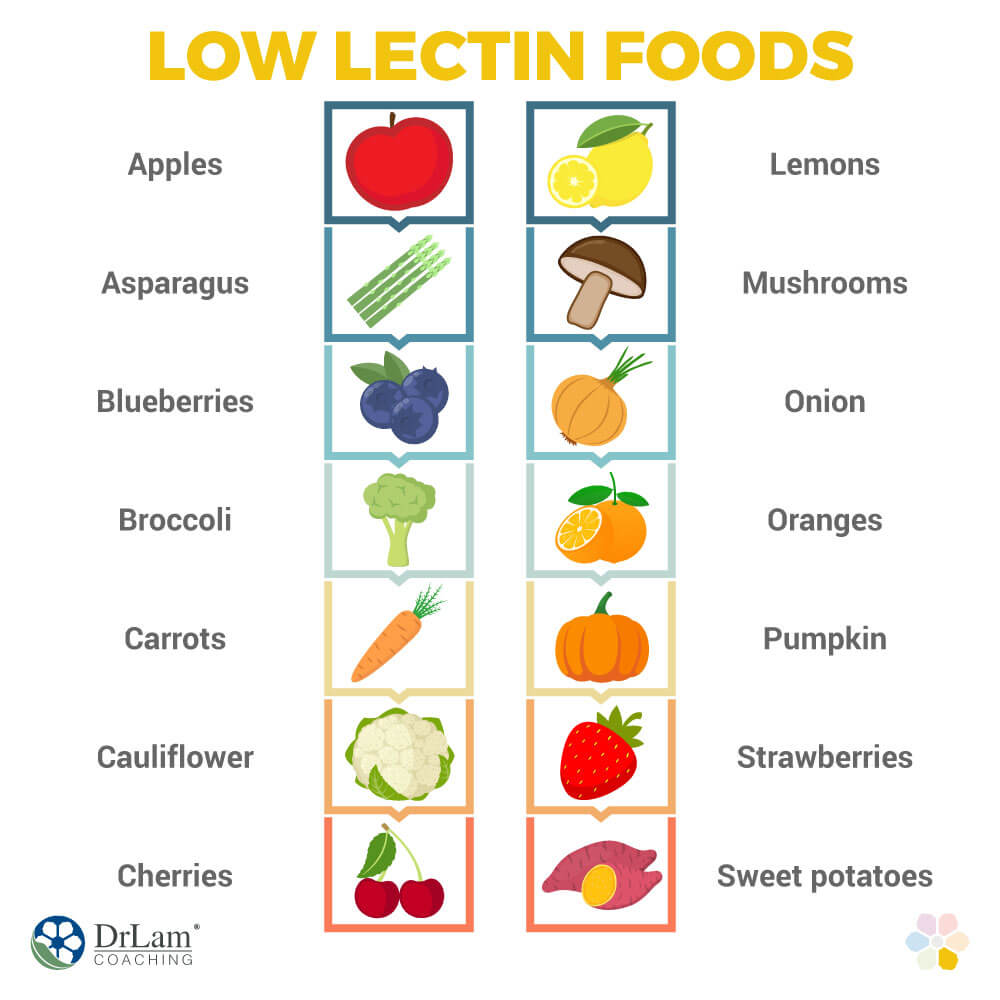
Truth be told, eating a lectin-free diet is impossible and very unhealthy. All foods contain lectins, and some of the healthiest foods contain the most. The real issue is whether or not the families of lectins you consume are compatible with your body type. If not, it's best to figure this out so you can avoid them.
Yes, there is little scientific evidence to support lectin intolerances, but lectin consumption in rats was shown to spike bacteria numbers in the small intestines, and strip away the mucous layer used for defense against illnesses such as peptic ulcers and leaky gut syndrome.
If you choose to be conscious about eating lectins, it may be more beneficial to choose foods that are low on the lectin scale, rather than avoiding them altogether. Low-lectin foods include
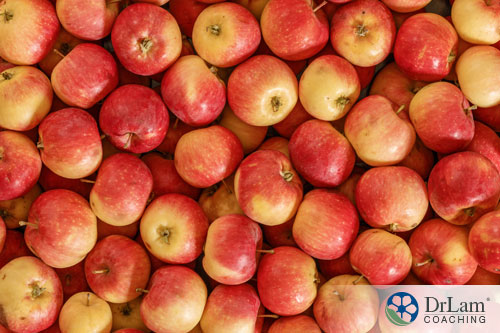
A low-lectin diet can also include any form of animal protein like beef, chicken, eggs, and fish, as well as healthy fats such as those found in avocados, butter, and olive oil. Many people claim animal proteins are easier to digest. Again, everyone is different, so it’s important to know your own body and how it responds to certain foods.
Finding out if lectins are affecting you is an easy process. It just requires time and commitment. Only a few genetic causes of lectin intolerance have been identified, but it’s good to rule them out by getting yourself tested for celiac disease and genetic dairy intolerance, if possible. However, it’s more likely that previous damage to your microbiome and gut wall are causing your lectin intolerance issues.
The most common lectin families that cause problems are
To test yourself, you’ll first want to eliminate the suspect group for approximately one week to 10 days. Refrain from eating any foods in that group and regularly check to make sure none of the lectins are in the other foods you’re consuming.
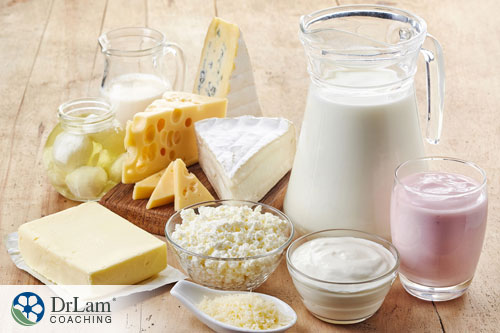 Second, after you have abstained from the suspect food for a reasonable amount of time, reintroduce the food group by eating a large amount of it over a single day. You‘ll want to eat other foods as well, then avoid the test group again for the following two days. Look for symptoms including
Second, after you have abstained from the suspect food for a reasonable amount of time, reintroduce the food group by eating a large amount of it over a single day. You‘ll want to eat other foods as well, then avoid the test group again for the following two days. Look for symptoms including
If you think you may have found an incompatible lectin, avoid those foods and test yourself again in a few weeks. If the symptoms flare up every time you eat that particular food group, you’ve found a lectin you’re intolerant to and you probably shouldn’t eat it.
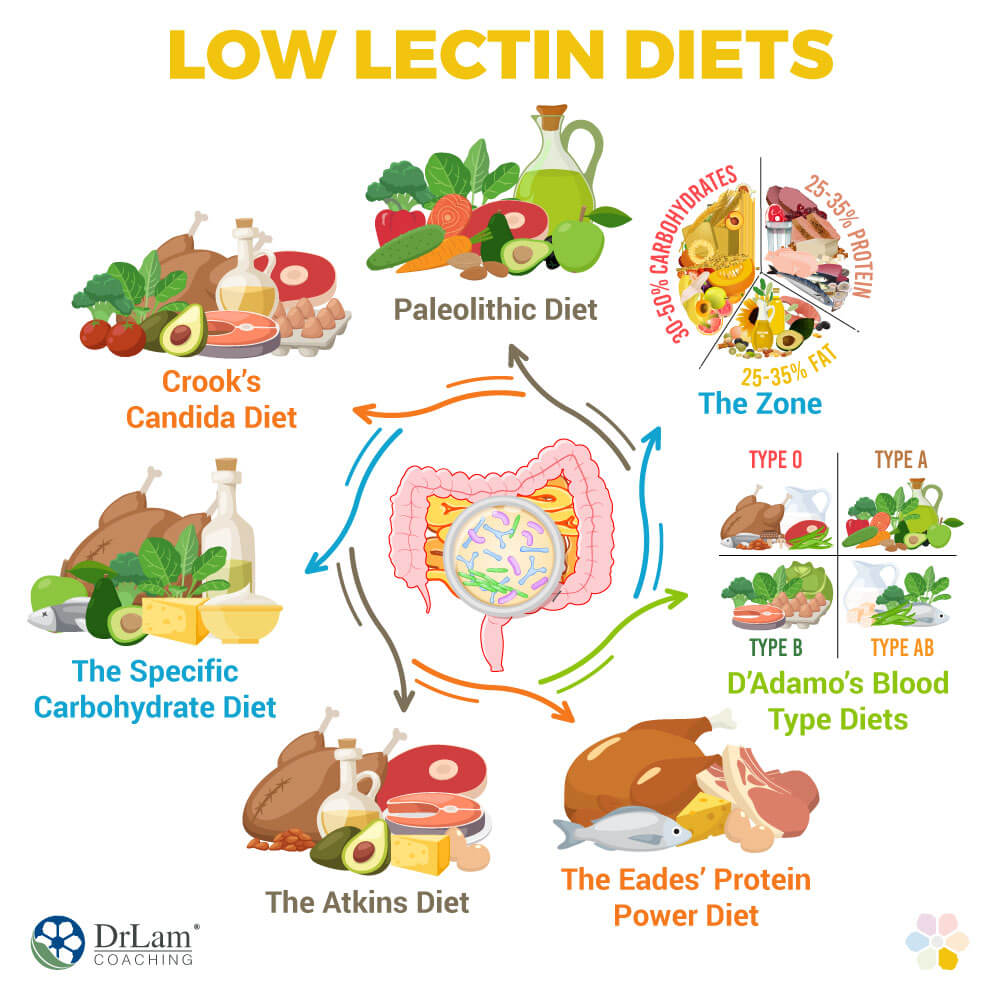
For many people, a low-lectin diet provides many health benefits. In difficult cases, other diets have also been used alongside the low lectin diet to cleanse the system and regain a more balanced state and healthier microbiome. Other diets that may go hand in hand with a low-lectin diet include
All of the above are high-protein, low-carbohydrate diets and often include natural unprocessed fats. In particular, they target carbs high in lectins and eliminate them. Research has connected these diets with improved health in those suffering from the following conditions:
Eating a diet high in proteins is clinically proven to improve many of the above conditions. Testing is still in the early phases, and some connections may be owing to lower fasting insulin levels.
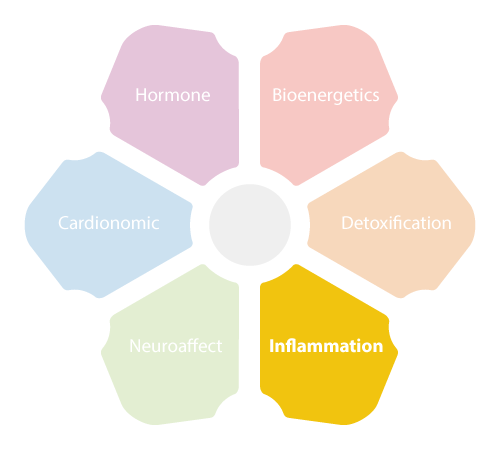 When the body is under prolonged or extreme stress, whether physical, environmental, psychological, or from the foods we eat, the adrenals glands can become fatigued and are no longer able to keep up with the body’s demands for the stress hormone cortisol. This can lead to Adrenal Fatigue Syndrome (AFS). All of the hormones in the body are affected. So even when only one part of the body experiences stress, multiple circuits of the NeuroEndoMetabolic (NEM) Stress Response System are involved; in fact, the entire body can be affected by a lectin intolerance. The stress within your body could eventually lead to a debilitating, chronic illness.
When the body is under prolonged or extreme stress, whether physical, environmental, psychological, or from the foods we eat, the adrenals glands can become fatigued and are no longer able to keep up with the body’s demands for the stress hormone cortisol. This can lead to Adrenal Fatigue Syndrome (AFS). All of the hormones in the body are affected. So even when only one part of the body experiences stress, multiple circuits of the NeuroEndoMetabolic (NEM) Stress Response System are involved; in fact, the entire body can be affected by a lectin intolerance. The stress within your body could eventually lead to a debilitating, chronic illness.
The science on lectin intolerances is still so new, therefore, it is hard to determine whether lectins can actually cause Adrenal Fatigue. But they can definitely aggravate a weakened immune and digestive system, as well as the symptoms if you’re already suffering from AFS.
If you think a lectin-free diet is something you’d like to try so you can determine whether lectins are indeed causing some of your discomfort, there are a few guidelines to keep in mind.
Since there is still a lack of evidence to back up the health benefits of a lectin-free diet, approach any new meal plan caution and do your research. Make sure any information you come across is science-based and not just from a website trying to sell cookbooks, supplements, or diet plans. A lectin-free diet removes many healthy plant-based foods, which provide a substantial amount of the fiber and nutrients your body needs for optimal wellness.
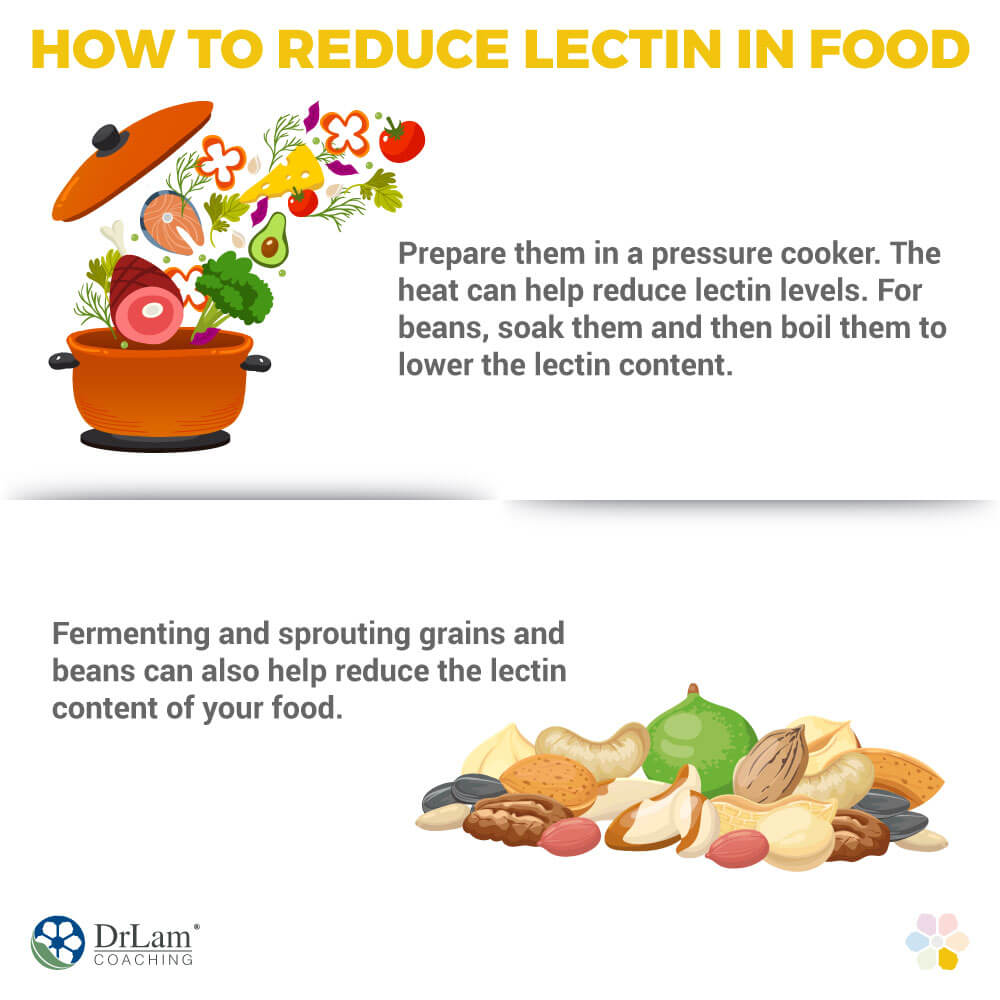
Only a minority of people can tolerate every food. The rest of us must learn what our bodies can, and can‘t, eat. And for some of us, that may be lectins. Only you alone can determine what your body can tolerate, and what your ideal foods are. It's a lengthy process, but worth the time.
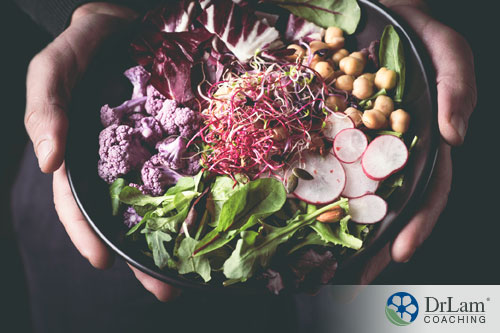 Most foods that contain lectins are part of a healthy, well-balanced diet and come highly recommended by most nutritionists and dieticians. The benefits of a diet rich in grains, fruits, and vegetables are well-established and supported by a huge amount of scientific evidence. And it’s possible that the health benefits you receive from these foods may outweigh the negative effects of lectins. The lectin avoidance diet may not be the right for everyone.
Most foods that contain lectins are part of a healthy, well-balanced diet and come highly recommended by most nutritionists and dieticians. The benefits of a diet rich in grains, fruits, and vegetables are well-established and supported by a huge amount of scientific evidence. And it’s possible that the health benefits you receive from these foods may outweigh the negative effects of lectins. The lectin avoidance diet may not be the right for everyone.
Always discuss any new diet with your healthcare practitioner or a dietician before you start. Your body requires a wide range of nutrients to function properly and an expert can help ensure you’re getting everything you need. Some dietitians specialize in gastrointestinal issues and can be very helpful in cases involving lectins and other gut irritants. They will often recommend elimination diets such as a lectin-free diet to determine the cause of your discomfort or allergic reaction. This involves taking certain foods out of your diet and carefully reintroducing them to identify causes of any food-related issues.
If you’re suffering from a chronic illnesses such as AFS, you may be fragile and weak. Therefore, any new diet, recipe, or supplement could worsen symptoms and lead to adrenal crashes. So, it’s important to proceed with extreme caution when making any dietary changes.
© Copyright 2021 Michael Lam, M.D. All Rights Reserved.
It would be impossible to avoid all foods with lectins since every living organism has this protein in its cellular makeup. However, some people may feel better consuming a low-lectin diet. Therefore, finding out if you have lectin intolerance could be important.
